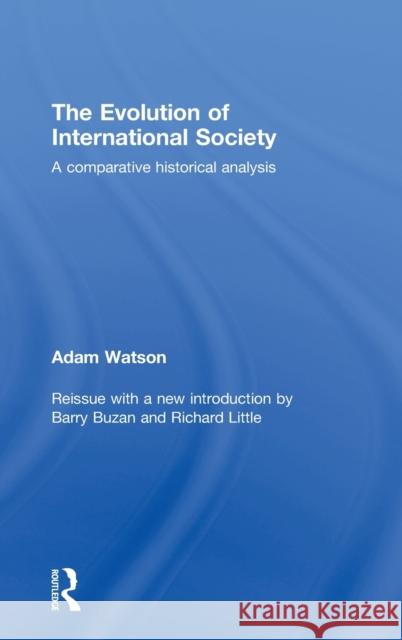The Evolution of International Society: A Comparative Historical Analysis » książka
The Evolution of International Society: A Comparative Historical Analysis
ISBN-13: 9780415452090 / Angielski / Twarda / 2009 / 350 str.
This is a real feast of a book. ... a landmark book. It is clear enough to be used as a teaching text, and could make an excellent introduction to the discipline for those courageous enough to revise their courses.' International Affairs
This is a bold, successful and valuable book... It is written with admirable clarity and merciful conciseness.' International Relations
A stunning success. Watson's book is a masterful piece of theoretical and historical analysis.' John A. Vasquez, Rutgers University
Adam Watson, who died in 2007, was a former diplomat who in his later academic career became a pioneer of the discipline of international relations. Originally published in 1992, The Evolution of International Society made a major contribution to international theory and to our perception of how relations between states operate, and established Watson s place within the canon.
This acclaimed and uniquely comprehensive work explains how international societies function across time, starting by examining the ancient state systems before turning to look in detail at the current worldwide international society. The book demonstrates that relations between states are not normally anarchic, but are in fact organized and regulated by elaborate rules and practices.
In this timely reissue, a new introduction by Barry Buzan and Richard Little assesses Adam Watson's career as a diplomat and examines how his work as a practitioner shaped his subsequent thinking about the nature of international society. It then contextualises Watson's original work, situates it alongside current work in the area and identifies the originality of Watson's key arguments, helping us to understand Watson s place within the canon.
"
`This is a real feast of a book. ... a landmark book.'- International Affairs
'...a bold, successful and valuable book.'- International Relations
This uniquely comprehensive study explains how international societies function across time, starting by examining the ancient state systems before turning to look in detail at the current worldwide international society. The book demonstrates that relations between states are not normally anarchic, but organized and regulated by elaborate rules and practices, which derive substantially from experience. Our present international society, for all its individuality, is only the latest in the series.
In this reissue, a new introduction by Barry Buzan and Richard Little contextualises Watson’s original work, situates it alongside current work in the area and summarises and analyses Watson’s key arguments.
This timely reissue serves as a major contribution to international theory, to our perception of how relations between states operate, and to our understanding of Watson’s place within the canon. It will be of great interest to students of political science, international relations, world history and the history of globalization, and historical sociology.











